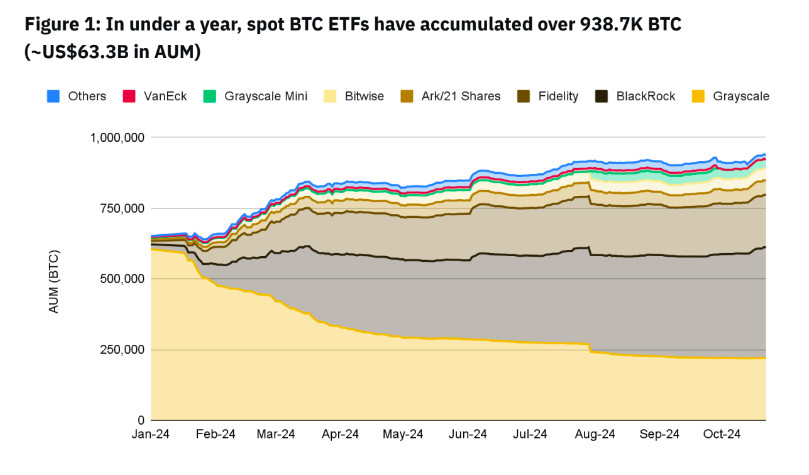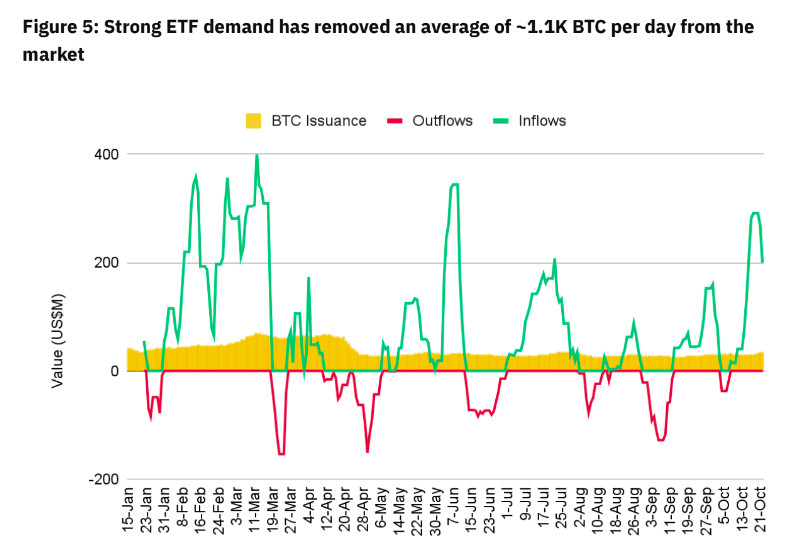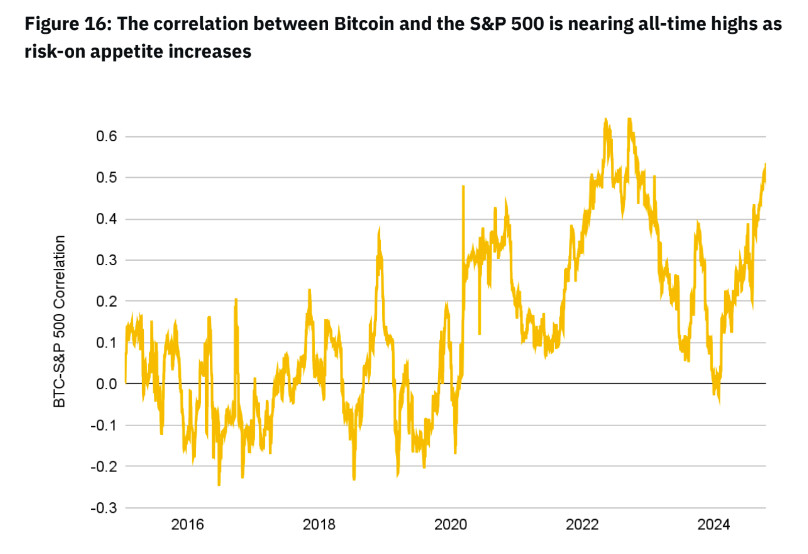Victoria d’Este
Published: October 25, 2024 at 3:00 pm Updated: October 25, 2024 at 11:39 am

Edited and fact-checked:
October 25, 2024 at 3:00 pm
In Brief
Binance’s latest paper explores the impact of spot BTC ETFs on market demand, liquidity, and adoption trends, revealing their significant influence on the market supply.

Examining these dynamics, the latest Binance paper, “Spot ETFs in Crypto Markets,” describes how spot BTC ETFs affect market demand, liquidity, and adoption trends.
Major capital has quickly poured into spot bitcoin exchange-traded funds, with holdings already totaling over 938,700 BTC, or over $63.3 billion. This number, which amounts to almost 5.2% of the entire supply of Bitcoin, highlights the extent to which spot BTC ETFs are influencing the market. Large net inflows of over 312,500 BTC support this demand, demonstrating the function of these ETFs in promoting consistent demand and lowering market supply.

As part of a larger trend toward securitizing digital assets, spot Bitcoin ETFs have been introduced, making them more accessible to investors who would otherwise prefer to interact with cryptocurrency through conventional financial instruments.
With ramifications for price dynamics and liquidity, the magnitude of these inflows demonstrates that spot BTC ETFs are more than just financial instruments; they are increasingly playing a key role in the structure of the Bitcoin market. Although the ETF mechanism is not new to the financial industry, its use in the cryptocurrency field has revealed demand levels that surpass even those of the first gold ETFs, indicating that Bitcoin ETFs have a distinct appeal.
ETF Divergence and Comparison with Gold ETFs
Gold ETFs, which are seen as more stable and have set a pattern for asset-backed funds in the past, grew very modestly in their early stages, drawing just around $1.5 billion over a similar period of time. However, in less than a year, BTC ETFs have amassed almost $18.9 billion, demonstrating the increased interest in Bitcoin as a hedge against wider economic volatility as well as a speculative asset. Remarkably, although just 95 institutions invested in gold ETFs in their first year, over 1,200 institutions have already invested in bitcoin ETFs.
However, Ethereum (ETH) ETFs have not been as successful as Bitcoin ETFs. Ethereum ETFs have had withdrawals of almost 43,700 ETH, or $103.1 million, according to the Binance data, with negative flows occurring in eight of the first eleven weeks.
With Bitcoin becoming a more popular digital asset for ETF investments, this disparity between BTC and ETH ETFs points to a shift in investor interest and market sentiment. Bitcoin’s status as the first cryptocurrency and its reputation as a digital store of wealth may be contributing factors to this trend since it appeals to more cautious investors.
Institutional and Non-Institutional Investors’ Contribution to the Growth of Bitcoin ETFs
The involvement of both institutional and non-institutional investors has greatly aided the growth of spot BTC ETFs. Strong interest in these products has been shown by non-institutional investors, who make up around 80% of demand. Retail investors and individual traders that prefer the ease of getting Bitcoin exposure through ETFs rather than personally managing wallets, keys, and exchanges make up this investment base.
There has also been a noticeable increase in institutional investment in Bitcoin ETFs. Due mostly to financial advisers, whose Bitcoin holdings surged by 44.2% to reach 71,800 BTC, institutional holdings have grown by almost 30% since Q1. The move toward more regulated and controlled access to digital assets is reflected in institutional investors’ slow acceptance of Bitcoin ETFs.

However, it is anticipated that a full-scale institutional adoption involving banks, consulting services, and broker-dealers would be a slow process that takes years to complete. Such a shift may make Bitcoin and other digital assets more widely accepted by bringing them into the mainstream of international financial markets.
Bitcoin’s Convergence with Traditional Finance (TradFi)
The Binance study highlights a noteworthy trend: the growing link between Bitcoin and conventional financial assets, namely the S&P 500 index. This increasing link, which has been stronger since the beginning of 2024, points to a change in how investors see Bitcoin. Bitcoin is now seen as both a risk-on asset and a hedge against macroeconomic uncertainty, whereas before, it was thought to be mostly uncorrelated. This dual role is a reflection of investors’ changing perceptions, as many now view Bitcoin as both a growth-oriented asset and a possible buffer during periods of market volatility.

Both market stability and investment methods are impacted by Bitcoin’s convergence with traditional finance. As the cryptocurrency market starts to act more like other well-known asset classes, for example, the stronger connection with stocks may indicate that the market is maturing. Furthermore, the interaction between conventional financial assets and digital currencies is anticipated to intensify as institutional players devote higher percentages of their portfolios to BTC ETFs, therefore reinforcing Bitcoin’s place in conventional investing frameworks.
The Impact of Spot BTC ETFs on Market Volatility and Efficiency
In addition to creating direct demand for Bitcoin, spot BTC ETFs have had a major impact on the cryptocurrency market overall through second-order impacts. Spot BTC ETFs make up an average of 26.4% of Bitcoin’s spot trading volume, with occasional peaks of 62.6%, according to the Binance report. Due to the ETF mechanism’s introduction of a more controlled form of demand for Bitcoin, this sizeable proportion has helped to improve market efficiency and lower volatility. These ETFs’ reliability can sustain more consistent price patterns, drawing even more traders to the market.
Venture capital is becoming more interested in spot BTC ETFs due to their liquidity, which allows for a broader market inclusion that goes beyond Bitcoin to include a range of blockchain-native assets. The market may become more stable and liquid as a result of this expanding on-chain presence, which is being driven by ETF demand both directly and indirectly. For instance, the greater legitimacy and liquidity offered by spot BTC ETFs may spur new development in the tokenized RWA space.
Disclaimer
In line with the Trust Project guidelines, please note that the information provided on this page is not intended to be and should not be interpreted as legal, tax, investment, financial, or any other form of advice. It is important to only invest what you can afford to lose and to seek independent financial advice if you have any doubts. For further information, we suggest referring to the terms and conditions as well as the help and support pages provided by the issuer or advertiser. MetaversePost is committed to accurate, unbiased reporting, but market conditions are subject to change without notice.
About The Author
Victoria is a writer on a variety of technology topics including Web3.0, AI and cryptocurrencies. Her extensive experience allows her to write insightful articles for the wider audience.
More articles

Victoria d’Este

Victoria is a writer on a variety of technology topics including Web3.0, AI and cryptocurrencies. Her extensive experience allows her to write insightful articles for the wider audience.











